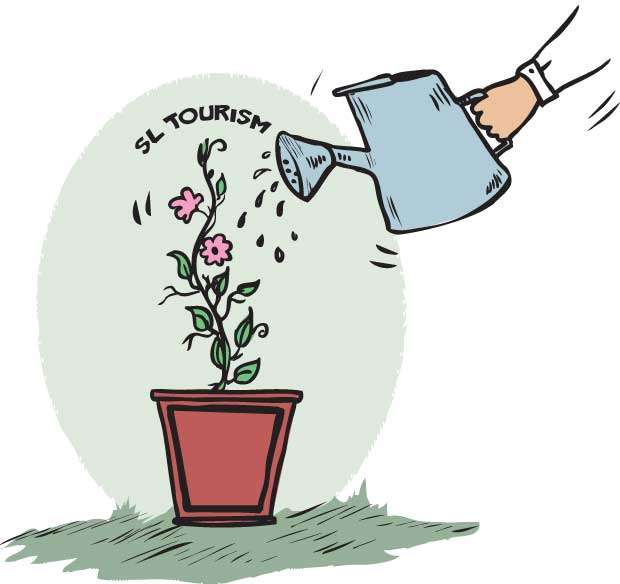Reply To:
Name - Reply Comment
Last Updated : 2024-04-28 16:27:00

Even during the height of the war, they brought in tourists to the country and pumped in the much-needed foreign exchange to the reeling economy. When Tsunami wrecked havoc in southern and eastern coasts of Sri Lanka, they were able to rise from wreckage within a very short time, showing their resilience. Yes, we are talking about Sri Lanka’s hospitality industry, which is the third largest foreign exchange earner for the country that accounts for about 11 percent of the gross domestic product.
From the passionate speech made by The Hotels Association of Sri Lanka (THASL) President Sanath Ukwatte at the association’s 53rd Annual General Meeting a week ago, where Prime Minister Ranil Wickremesinghe was the chief guest, we understand that all at the hospitality trade isn’t hunky-dory. Despite the record tourist arrivals, the publicly quoted hotel companies have been making losses. Although the financial accounts of the privately owned hotels are not in the public domain, they couldn’t be doing any better than their listed peers. So, where do all these tourists who visit Sri Lanka stay? The answer is Sri Lanka’s thriving informal accommodation sector.
Although exact data on the informal sector is scarce, several independent studies suggest that over 50% of tourists visiting Sri Lanka opt for accommodation in supplementary establishments i.e. guesthouses, hostels, rented apartments etc. Since the end of the war in 2009, a visible rise in the informal sector can be seen amid growing arrival numbers as a result of the lack of capacity in the formal sector due to the lack of investments during the conflict period. The growth in the phenomena of the independent traveller has also contributed to the rise of a booming informal sector in many a country.
So, in this context, a vibrant informal sector may be vital, but letting that to overshadow the tax paying, regulated formal industry could be imprudent. The profits of the registered establishments in the formal accommodation sector are heavily taxed -- 15% VAT, 2% NBT, 10% service charge and 1% Tourism Development Levy. However, the informal sector accommodation providers pay no such taxes, creating an unequal playing field.
Apart from losing out the tax income, the other negative implication stemming from this development to the wider economy is the lack of big investments going into the hospitality sector. It has been no secret that during the last three or four years, investments into the hotel sector have dried out significantly and some investors who have already made investments have scaled down. Obviously this is not a good development for a country, which aspires to make tourism the number one foreign exchange earner.
If the authorities feel that getting the informal sector under the tax net -- especially given their low-cost operating model -- is difficult, it is reasonable they should look into giving some concessions to those in the formal sector who pay taxes, generate direct and indirect employment for over 350,000 people and continue to make sizeable investments into the growth of the hospitality industry.
Ukwatte in his speech made several important points, the authorities should take serious stock of. One such was the call to recognize tourism as an export industry. The government should seriously look at including tourism into its export strategy and provide the necessary concession similar to other export industries. Ukwatte’s suggestion to establish tourism trade zones, similar to export processing zones, could also be a very innovative approach to develop some of the under-developed tourism hot spots in the eastern and the northern parts of the island. Also, the authorities should look at eliminating some of the discriminatory taxes on the hotels, such as NBT, which is not applied to most of the other stake holders in the travel sector.
Further they should take cues from how other governments in the world are dealing with informal sectors, evidently much bigger than in in Sri Lanka, and try to bring them under some sort of regulatory control, making sure that those businesses pay their due taxes.
A strong formal sector, which makes continuous investments into the industry, is a must for the type of tourists the government wants to attract. Given Sri Lanka’s limited capacity, what really matters is the quality of the tourists and not the quantity. It is essential that Sri Lanka itself is a fine balance between high spending tourists and backpacker and all the country promotion and marketing campaigns should revolve around this notion. We all should always remind ourselves that having such potential in tourism -- the culture, heritage, beaches, wildlife, top class hotels, hospitable people -- worker remittances still remain the highest foreign exchange earner for the country, which is nothing less than a national embarrassment.

Add comment
Comments will be edited (grammar, spelling and slang) and authorized at the discretion of Daily Mirror online. The website also has the right not to publish selected comments.
Reply To:
Name - Reply Comment
US authorities are currently reviewing the manifest of every cargo aboard MV
On March 26, a couple arriving from Thailand was arrested with 88 live animal
According to villagers from Naula-Moragolla out of 105 families 80 can afford
Is the situation in Sri Lanka so grim that locals harbour hope that they coul